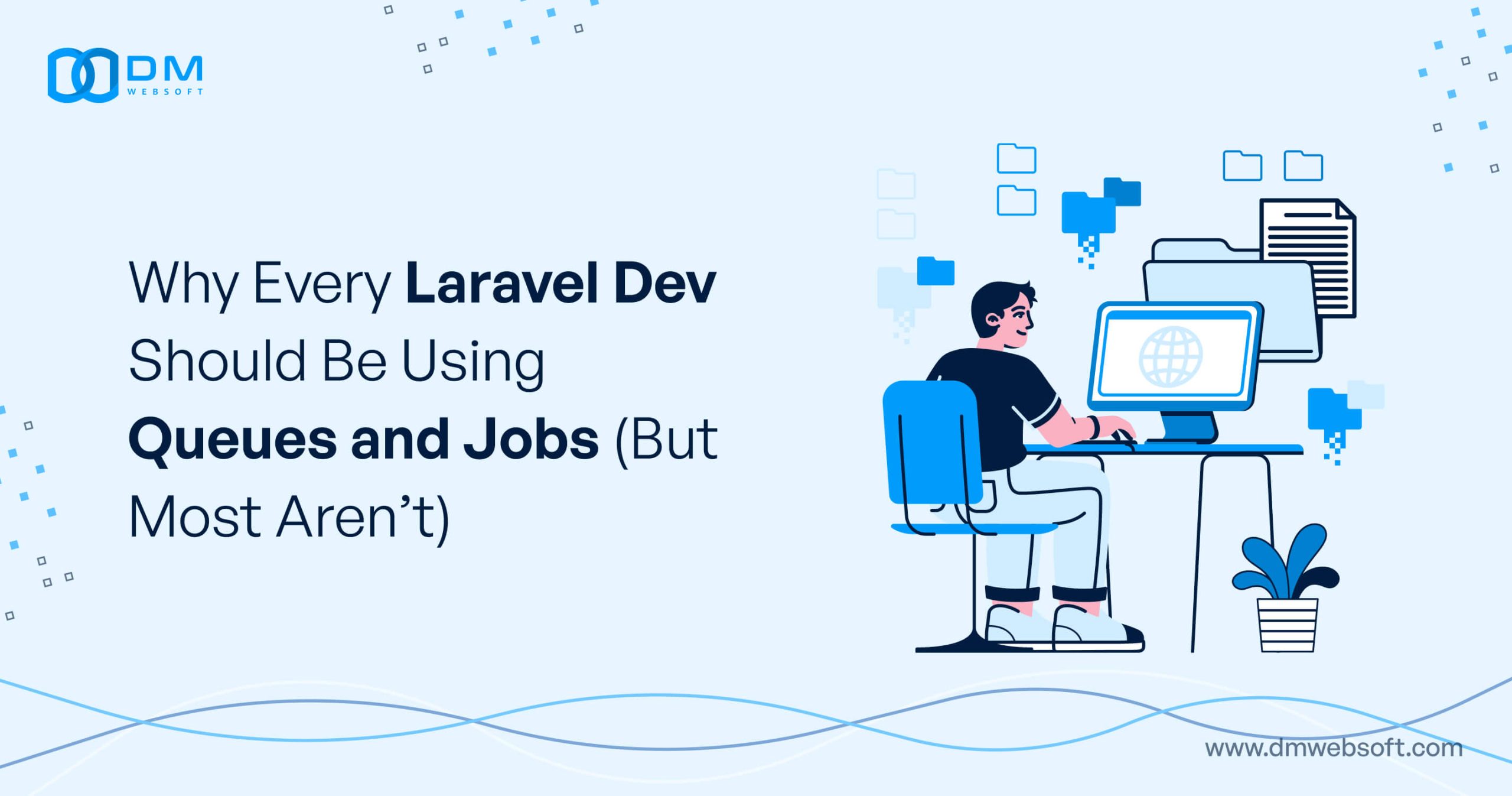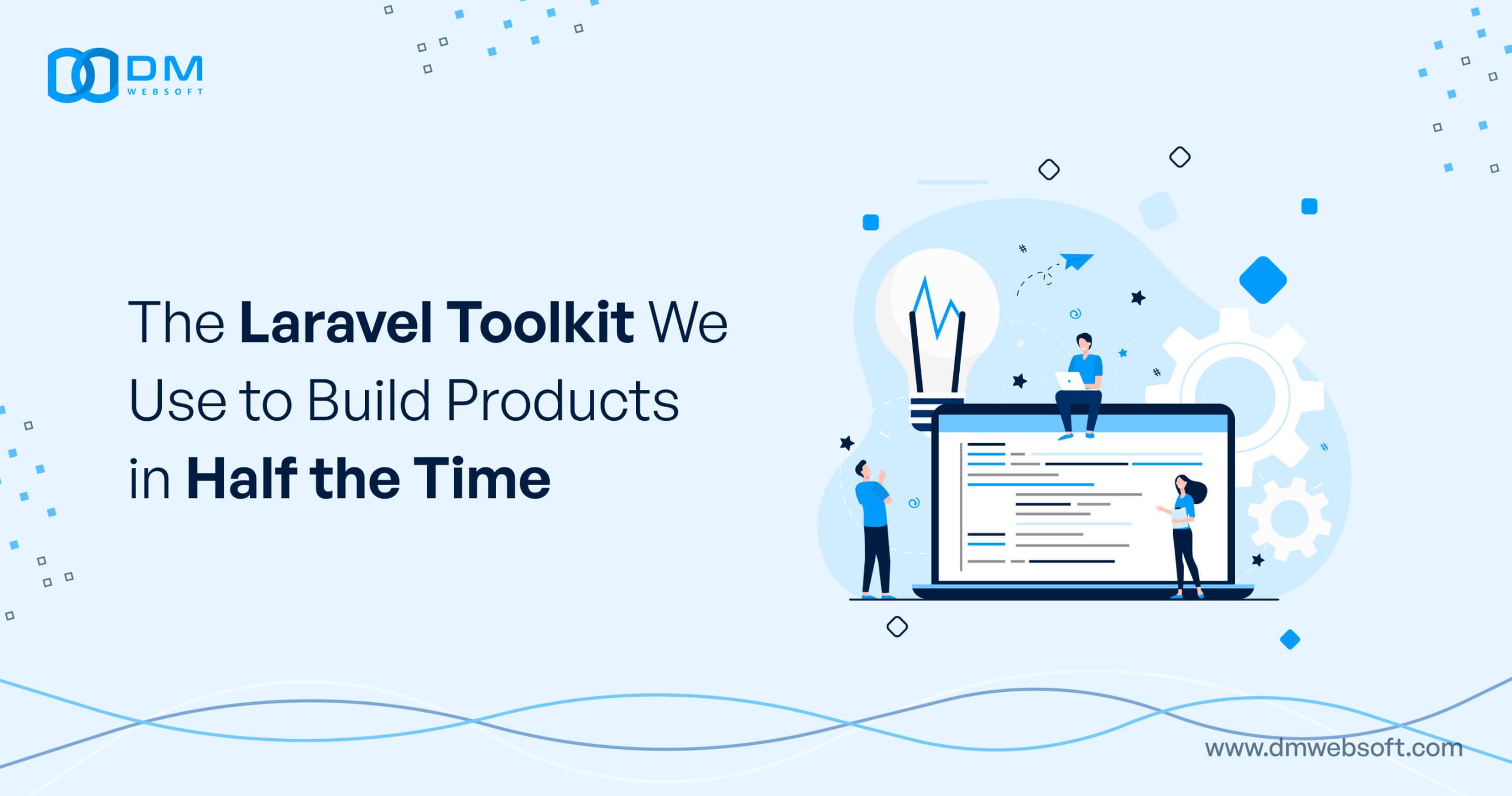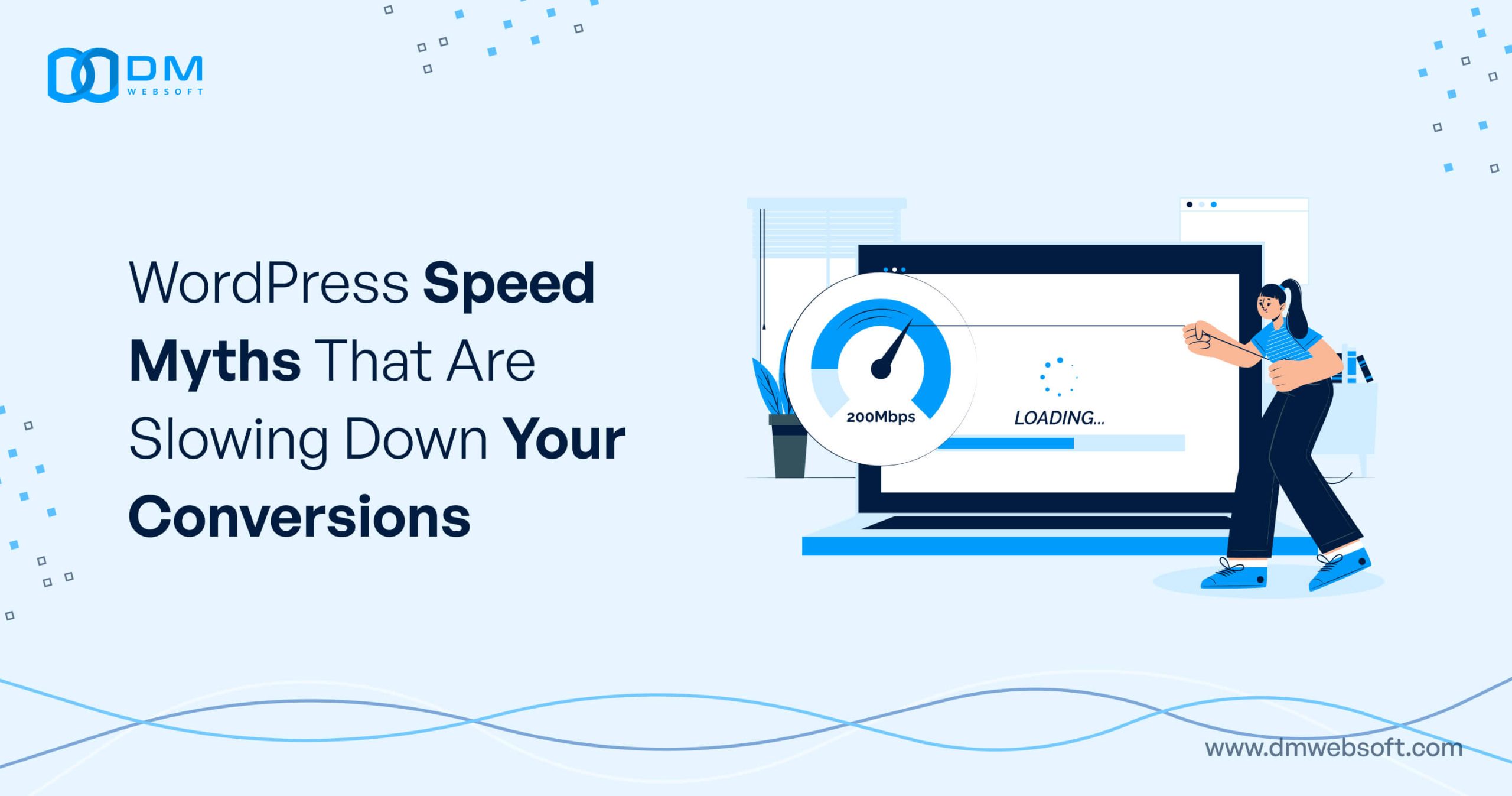DM WebSoft LLP exceeded our expectations! Their seasoned team of experts delivered a website that perfectly captures our brand essence. Their 15+ years of experience truly shine through in their exceptional web development skills.
Phalcon vs. FuelPHP: A Deep Dive into Performance and Usability
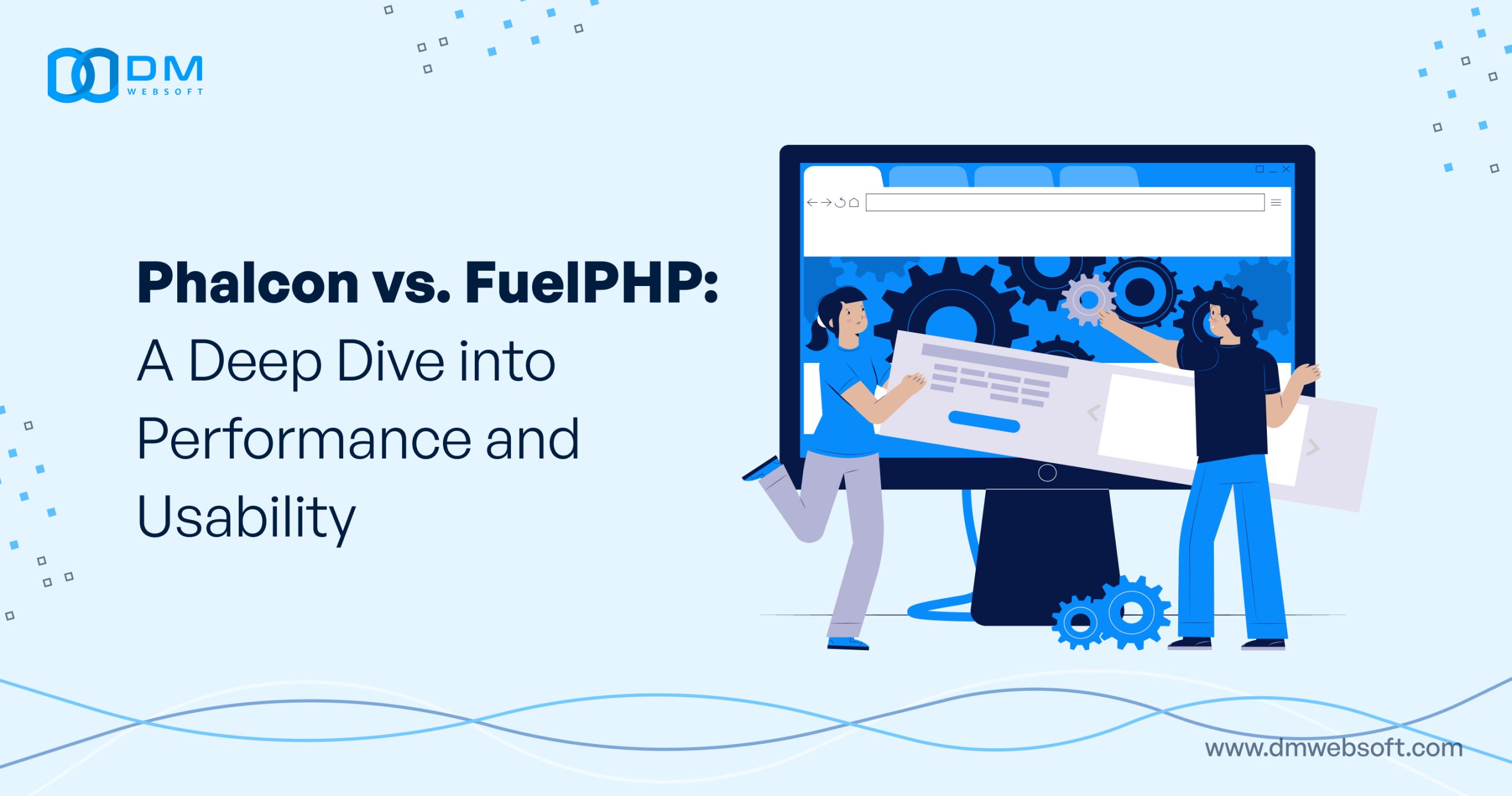
TABLE OF CONTENT
Get in Touch
Introduction

The perfect choice of PHP framework matters for any web development undertaking to achieve success. There is a sea of options available, and developers always get into a fix. Two of the most popular and often hotly debated frameworks are Phalcon and FuelPHP. These two frameworks come with their sets of features and benefits and, therefore, need to be gauged on performance and usability before users decide on them.
Phalcon is known for offering high performance and for being efficient. It is a full-stack PHP framework that uniquely takes C-extensions to use in optimizing the model part of the framework, thus marking it as one of the fastest available frameworks. Conversely, FuelPHP is celebrated for its flexibility and modularity. It is a framework based on the HMVC (Hierarchical Model View Controller) design pattern that provides developers with tools to build robust applications.
Throughout this book, we are going to dive deep into the performance and usability of both Phalcon and FuelPHP. We aim to provide a detailed comparison to help you make a decision regarding which framework suits your project needs. Whether you are a developer, project manager, or a business owner, knowing about their strengths and weaknesses would put you in a position to make an informed decision.
At DM WebSoft LLP, we majorly deal with PHP Development and often use both the technologies of Phalcon and FuelPHP while working on day-to-day projects. Our experts can guide you with the right choice of framework that can guarantee success for your project. By the end of this blog post, you will have understood the differences between Phalcon and FuelPHP and how our services can help you take advantage of these frameworks to craft high-performance web applications.
This blog aims to provide more information about both the features and benefits of Phalcon and FuelPHP than to share their practical application. We will look at some of the performance benchmarks, usability factors, and market trends. Moreover, we shall go further into the security and maintenance aspects of both frameworks so that you have a clear idea about everything.
As you keep on reading further, you will also find that under each subheading, we have included a relevant keyword there to help understand the core elements of each framework. It not only increases the readability of the blog but also ensures that the content becomes SEO-friendly, so you can more easily find what you are looking for.
On the whole, in this write-up, I try to make a comparison between Phalcon and FuelPHP in detail for you to choose wisely. We believe this is going to give you some sort of guideline through all the complexities of how to choose the proper PHP framework for your project, along with insights from industry experts and data-driven analysis. And do not forget, at DM WebSoft LLP, we are here to support you in all your needs for PHP development, thus making sure that your project is a great success from head to toe.
PHP Frameworks
Understanding PHP Frameworks
PHP frameworks are powerful tools for developers, enabling them to write robust, scalable, and efficient web applications. Such frameworks facilitate organized development of code and thus make it easy for web applications to be maintained, managed, and scaled up. This chapter will introduce what PHP frameworks are, how they benefit the development process, and briefly touch upon popular PHP frameworks, focusing on Phalcon and FuelPHP.
What is a PHP Framework?
In simple terms, PHP frameworks are a set of classes and functions that help to develop applications. The frameworks provide predefined structures in such a manner that developers write less code for repetitive tasks. It also enforces the coding standards and best practices to maintain code cleanliness, organization, and maintainability. Usually, PHP frameworks are based on the Model-View-Controller pattern, which separates the application’s logic, user interface, and data. It helps manage the code quickly and work with other developers.
Advantages of Using a PHP Framework
- Efficiency: PHP frameworks accelerate the entire development process with pre-built libraries and components that just need to be deployed. It helps save a lot of time and resources spent developing an application from the ground up.
- Security: Frameworks come with inbuilt security features that protect you against most vulnerabilities, including SQL injection, cross-site scripting, and cross-site request forgery. These are some of the things that make your application secure and robust.
- Scalability: PHP frameworks are created for large-scale applications. They offer some features, for example, caching, routing, and database abstraction, which help one scale the application further.
- Maintainability: Owing to a structured coding environment and consistent coding standards, codebase maintenance and updates are quickly done; even with long-term projects and teams.
- Community Support: Most PHP frameworks come with active communities that contribute to the development of frameworks, create plugins, and give support; you’ll never fall short of resources and knowledge.
Overview of Popular PHP Frameworks
There are a bunch of popular PHP frameworks for programmers, and each one is unique in its way, with features and benefits. This section will discuss two such renowned frameworks: Phalcon and FuelPHP. Both are very famous because they are performance-oriented and user-friendly.
Phalcon: Phalcon is an excellent performance-based PHP framework that has been implemented as C extensions to boost the performance of your code. It is an excellent solution for very high-performing applications.
It’s a full-stack PHP framework that provides features like routing, ORM, caching, and security, with particular attention to improving the development experience.
FuelPHP: FuelPHP is a flexible, modular PHP framework that adheres to the HMVC (Hierarchical Model View Controller) design pattern. It enables the developers to structure their code in a modular and reusable way, hence easy handling of large applications.
FuelPHP has been one of the most straightforward frameworks with many functionalities, such as routing, ORM, authentication, and caching.
Now let’s compare the functionalities and benefits of Phalcon and FuelPHP in more detail in performance, usability, and other essential characteristics to be able to make a decision on which framework better fits into your project. We’ve developed with Phalcon and FuelPHP for many years at DM WebSoft LLP.
Our team of experts can help you to choose the proper framework and deliver tailored solutions according to your needs. Whether your project demands a performance-critical application or an agnostic, flexible, and scalable solution, we have the experience to turn challenges into something extraordinary.
Phalcon
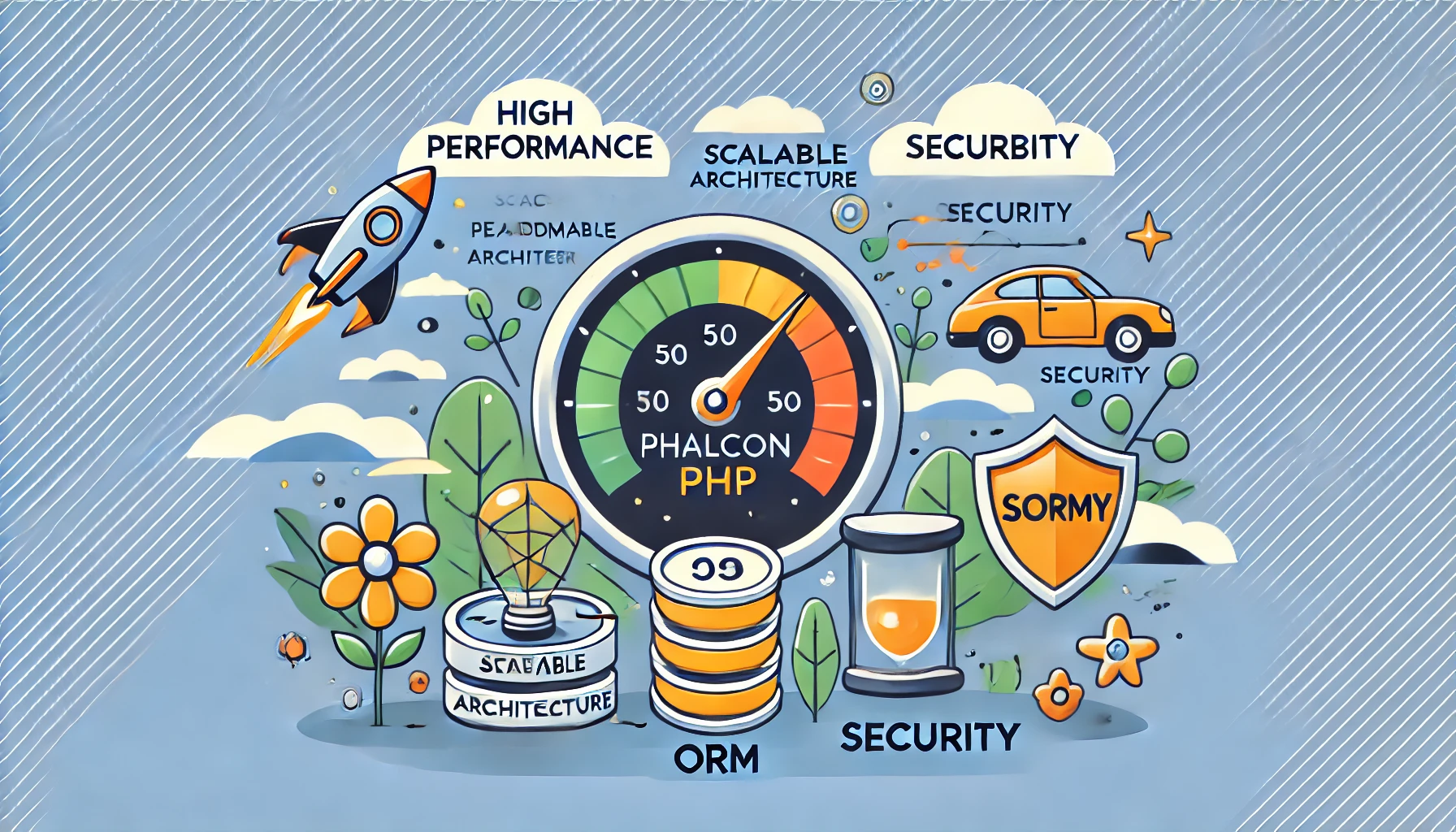
This is a very advanced PHP framework that is full-stack and extremely high-performing. It is implemented as C-extension, so one can boast of it being an available resource, unlike any other resource. This section discusses the features of Phalcon, benefits, and technical architecture differences.
About Phalcon
Phalcon was launched in 2012 and aimed at having an efficient and swift PHP framework. Phalcon is placed at the lower-level layer than most other PHP frameworks, meaning it’s fast in executing applications simply by working with C extensions. Decided on its design approach, Phalcon is one of the fastest available PHP frameworks and is quite popular with developers who have high-performance needs.
- Main high-performance features: Implemented as a C-extension, Phalcon is optimized to offer high performance and low resource consumption—ideal for applications striving for quick responses and efficient use of resources.
- Full-stack framework: From routing and ORM to caching and security, Phalcon bundles many varied functionalities. This is a considerably flexible framework in that it can control a great deal of web development in totality.
The ORM in Phalcon is mighty and yet very flexible since it enables the database to be interacted with in an object-oriented manner. This in turn, facilitates all database operations and also takes care of a clean and maintainable codebase phalcon ships with the fastest and most efficient templating engine, which is Volt.
With Volt, dynamic and reusable templates can be developed quickly without learning a new syntax. The learning curve for the syntax of Volt isn’t that high since there are quite a few capabilities in place to aid in development.
- Dependency Injection: Phalcon DI container allows proper dependency management by developers. It helps provide modular and testable codebases, which in turn makes the process of maintenance and extension easier.
- Security Features: Phalcon has built-in features that secure it against all common web vulnerabilities, such as SQL injection, XSS, and CSRF. Anything developed using Phalcon is very safe and secure from potential vulnerabilities.
Advantages of Using Phalcon
- Performance: The significant advantage when using Phalcon is in its performance. With Phalcon’s performance, it has been implemented at a lower level. This brings more speed by executing codes at lower resources than other frameworks. So, this will be the right choice for your performance-critical applications.detailed feature sets with easy-to-use components aid in developing applications at a much quicker rate.
- Rich Documentation: Phalcon has an exhaustive, well-kept documentation body with everything the developer might need. This includes guides, tutorials, and API references that would ensure a developer has all they need to overcome any challenge without a hassle.
Phalcon Technical Architecture
Phalcon has been built keeping in mind performance and efficiency. It’s C-based, compiled, and loaded into the server’s memory, which executes more quickly than a framework written in pure PHP. This eliminates overhead from the runtime interpretation of PHP and, therefore, increases response time, using fewer resources.
The modular architecture of Phalcon allows developers to use only the necessary components, resulting in a very lightweight and efficient codebase. Therefore, the framework is easily extended and customized to concrete project needs.
In a word, Phalcon is challenging and highly effective for developing performance- and scalability-oriented developers. This architecture is incomparable, making it a perfect tool for the agile development of high-performance web applications. The experts in our team here at DM WebSoft LLP help unlock the power of Phalcon for you to develop applications that are fast, secure, and highly scalable as per business needs.
FuelPHP: An Overview
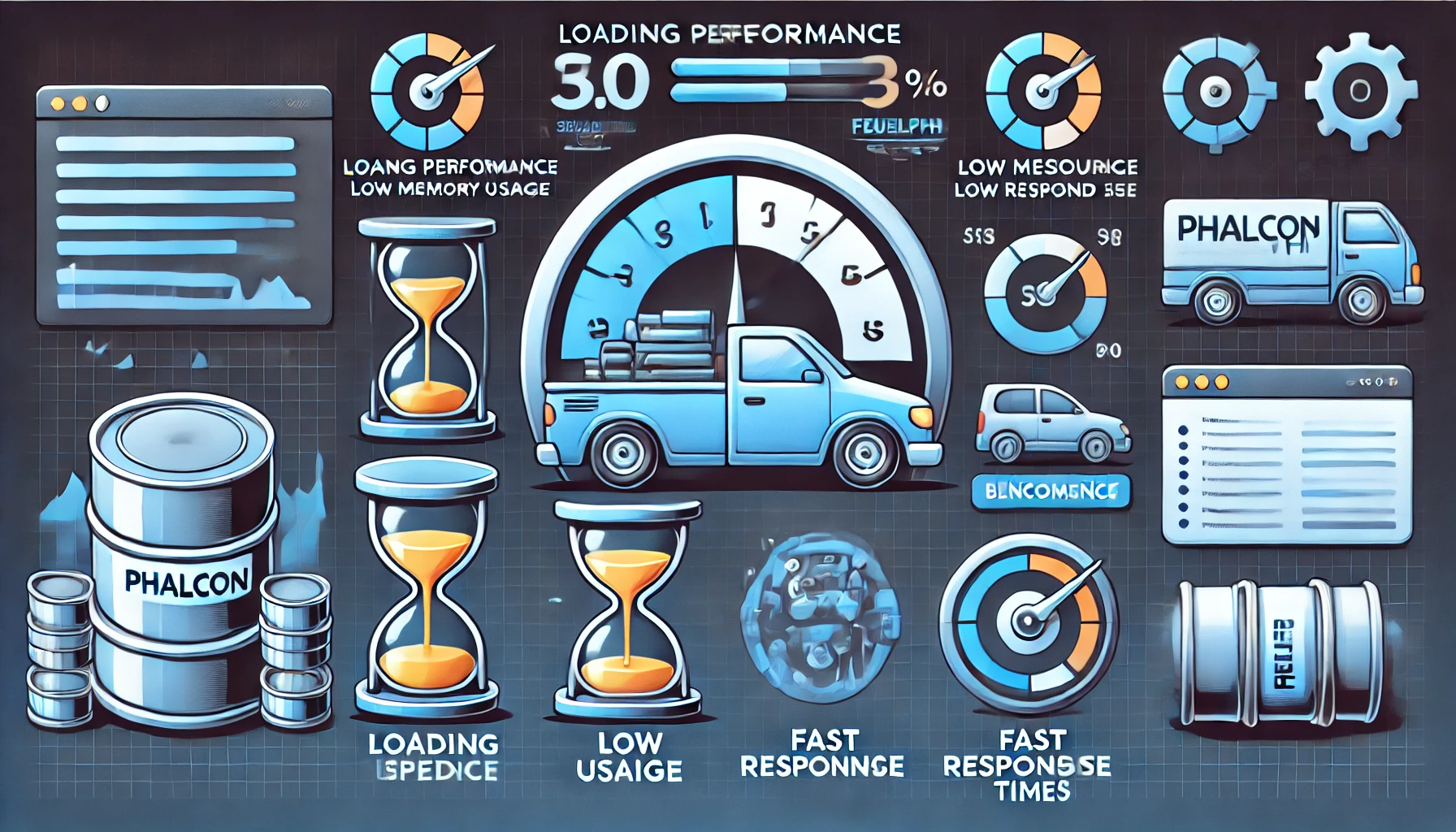
Another critical PHP framework, FuelPHP, is an ultimate flexible and modular PHP framework. It utilizes the HMVC (Hierarchical Model View Controller) design pattern to allow developers to work on modular and reusable code. In this section, we would like to detail the significant features and advantages of FuelPHP, along with its technical architecture.
An Overview of FuelPHP
FuelPHP was brought into the world in 2010 with the primary intention of developing a flexible and lightweight framework for PHP developers. This framework is designed to be very extensible with a simple yet compelling structure that can surely meet the high demands of web applications and will support all configurations. Its dynamic nature gives flexibility and ease of adaptation, and it is also widely used.
Key Features of FuelPHP
- HMVC Architecture: FuelPHP’s Hierarchical Model-View-Controller architecture enables developers to write modular and reusable code. The design pattern supports the separation of concerns, thereby facilitating extensive application management and maintenance.
- ORM (Object-Relational Mapping): Similar to Phalcon, FuelPHP also provides a powerful ORM that simplifies database-related operations. ORM: It is flexible and extensible. Developers can efficiently work with complex data relationships.
- Routing System: FuelPHP has a powerful and flexible routing system that allows developers to define custom routes for their applications, giving clean URLs with much-improved SEO.
- Template Engine: FuelPHP comes with a very lightweight and efficient in-built template engine named View, which makes it very easy to create dynamic and reusable templates within your applications. The template engine supports features like template inheritance and partials.
- Security Features: Some security features have been integrated into FuelPHP to eliminate common web vulnerabilities, such as SQL injection, XSS, and CSRF, from its applications to make them safe and reliable.
- Package Management: FuelPHP’s package management allows one to build packages of reusable code, which can easily be included in another project.
Advantages of Using FuelPHP
- Flexibility: FuelPHP is highly flexible since its modular architecture and the use of HMVC design patterns, promoting free creation and handling of modules independently, thus leading to easier maintenance and updates of the codes.
- FuelPHP Performance: Developers can easily maintain modules separately, improving their work in upgrading the code.
- Modular design: A modular design makes the framework useful, with developers needing to use only the required elements to keep an application lightweight and efficient. It provides an easy way to extend with custom packages as well.
- Community support: FuelPHP comes with a large community of developers who contribute towards the development and also support other members in need through mainly forums, documentation, and tutorials. This helps developers quickly obtain any form of resource or help they need.
- Ease of Use: The structure of FuelPHP is very intuitive and straightforward, making developers quickly get back on track and fast in the development of the application. Moreover, the framework has elaborate documentation and tutorials, which make it easier for new users to learn about it.
- Scalability: FuelPHP can ably support small-sized and enterprise-level, large-sized projects for application development. Its efficient architecture ensures that applications stay responsive and scalable when they grow.
The technical architecture of FuelPHP
FuelPHP is based on the HMVC design pattern, in which modularity and order are allowed within the architecture. Models, views, controllers, and routes are allowed under each module; it can manage different parts of an application very quickly and effectively. The routing system in the framework is very flexible and will enable developers to set custom routes with URL structures. This allows flexibility in customizing applications to suit specific requirements and makes applications user-friendly.
FuelPHP enjoys enhanced flexibility in modularity through a package management system that enables developers to create reusable packages of code. The packages created are also easily integrated into various other projects, thus ensuring code reusability and consistency across the application.
In a nutshell, with FuelPHP, one will have a flexible modular solution for developers requiring ease of use and scalability. FuelPHP is a web application framework with excellent HMVC architecture and an extensive feature set for an increased range of web applications. The strength of FuelPHP will be what our team at DM WebSoft LLP will help you leverage, building dynamic, secure, and scalable applications that reach your business needs.
Performance Comparison
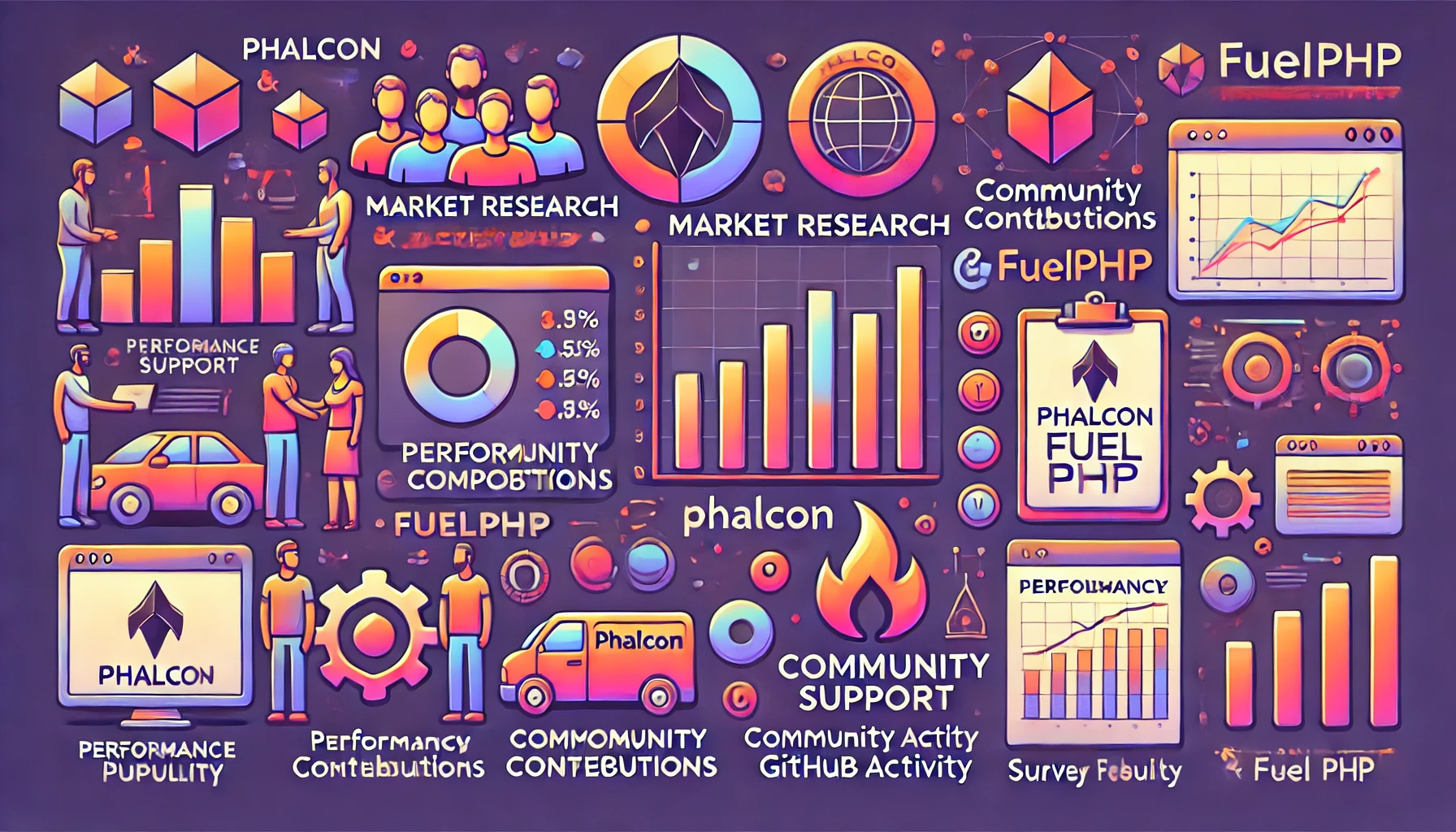
Performance is one of the critical aspects that lead to selecting a PHP framework. Developers will always be interested in a framework that can handle high loads and complex operations without compromising speed and efficiency. This section will seek to compare Phalcon and FuelPHP performance by discussing the most critical metrics, giving an in-depth report of benchmarking results, and analyzing findings.
Benchmarking Phalcon and FuelPHP
Several benchmark tests were carried out in this section to test the speed, usage of resources, and response times of Phalcon and FuelPHP. In general, these benchmarks present a complete picture of how each framework behaves under various conditions.
- Loading Speed: Loading speed, of course, is one of the most critical aspects of any web application. Faster loads imply better UX and SEO performance. In our performance testing, Phalcon does load applications significantly faster than FuelPHP. The reason is that Phalcon has a low-level implementation as a C extension and can thus perform operations more efficiently.
- Resource Usage: Resource usage is one of the critical factors for any scalable application. Phalcon is designed in such a way that the usage of resources is minimal, making it a very efficient application. Although FuelPHP doesn’t exhibit results as fast as Phalcon, it still performs quite well on resource usage because of its modular architecture.
- Response Time: For applications that require a real-time response, Phalcon was the clear winner, and the response time for most cases was far better than that of FuelPHP. This means that Phalcon can work under a higher load of requests with low latencies.
Performance Metrics and Results
To make this comparison reasonable, we have observed the following performance metrics from the two frameworks:
- Requests Per Second (RPS): The number of requests that could be satisfied by the framework in one second. Phalcon: 1,800 RPS on average FuelPHP: about 1,200. This means Phalcon can entertain more requests in the same period and is hence more apt for high-traffic scenarios.
- Memory Usage: an essential feature that factors into the performance and scalability of an application is memory efficiency. As a result, the memory used by Phalcon is considerably low compared to FuelPHP. On average, Phalcon consumed around 30 MB of memory per request, while FuelPHP averaged about 50 MB. Such efficiency makes Phalcon a good performer in high-load situations.
- Latency: Real-time applications necessarily require low latency. The latency tests revealed that Phalcon’s response times were, on average, about 50 milliseconds, while the ones from FuelPHP were around 80 milliseconds. This difference in latency makes Phalcon more suited for applications that require immediate response.
Analysis and Interpretation of Benchmark Results
There can be no doubt that Phalcon performs much better than FuelPHP in all the tests conducted. The low-level implementation that comes with a C extension basically gives it an upper hand on matters to do with speed, usage of resources, and response times. This makes Phalcon the best choice for critical applications in terms of performance and effective scaling. However, it is worth noting that FuelPHP is high-performing, which is possible mainly due to its flexibility and modularity. For projects with a high level of flexibility and simple framework integration with modular architecture implementation, FuelPHP is still good.
Performance Conclusion
Overall, by the numbers, Phalcon holds its ground as a choice of framework for developers focused on speed and efficiency. Due to these features, it excels in handling high volumes of requests, minimal resource usage, and low latency; hence, it is a favorite framework for performance-critical applications. Meanwhile, FuelPHP shows good competitive performance and, at the same time, can be very flexible with its modular architecture, which makes it a good choice for projects that require that flexibility and ease of use.
At DM WebSoft LLP, we mean when we say that performance matters for web applications. Our highly experienced experts can assist you in selecting the proper framework relevant to your particular demands and work out an application that is supposed to be efficient, swift, and scalable. Phalcon or FuelPHP—whatever your choice—we are prepared to offer up-to-date and genuinely high-performance software solutions oriented towards business tasks.
Conclusion
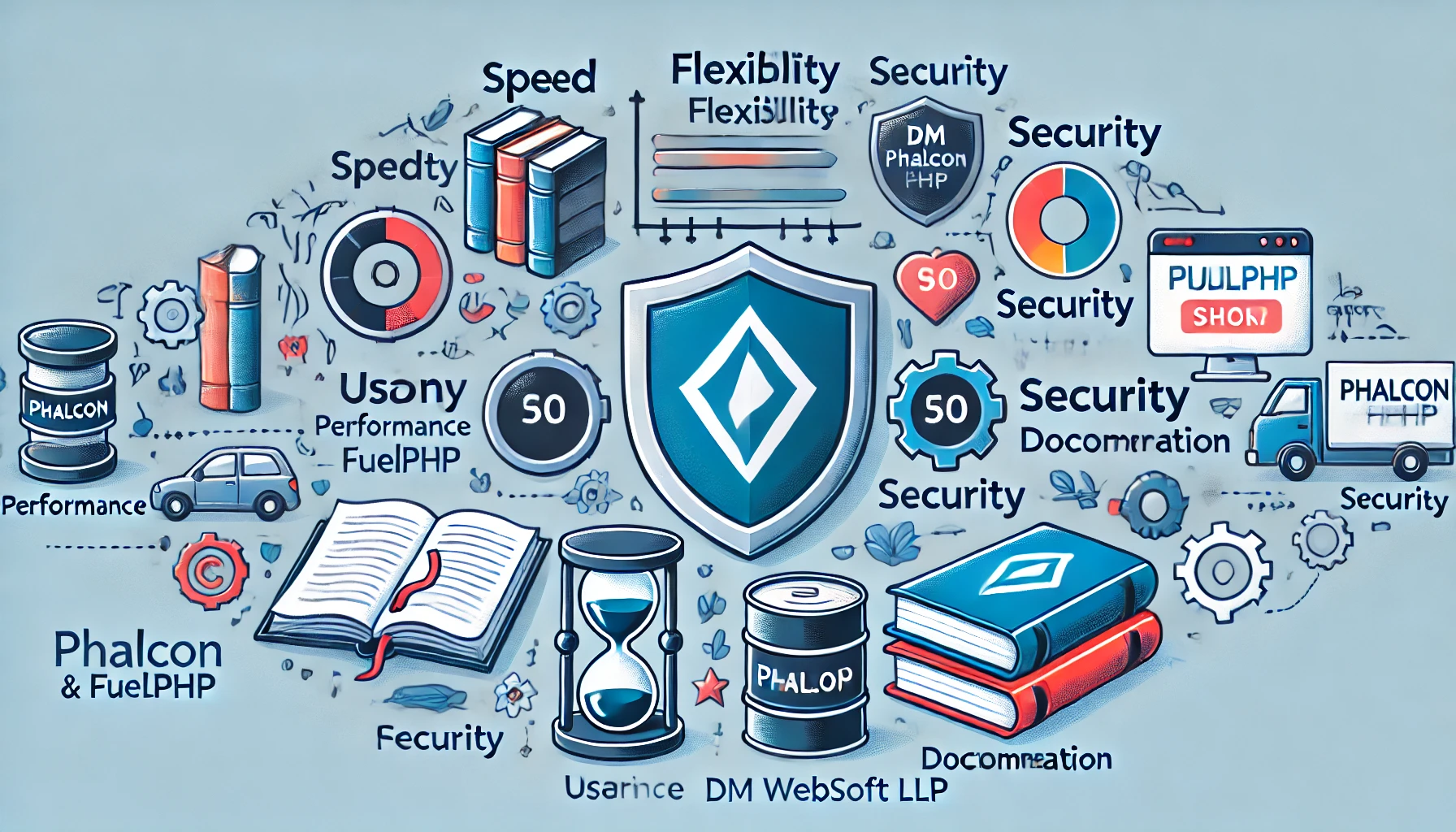
So, now the ball is in your court. Choosing the proper PHP framework means everything in the dynamic world of web development. Phalcon and FuelPHP have advantages that adapt them to some needs and tastes. By exploring their features, performance, usability, and security, you can make a well-informed decision that will match the requirements of your project.
Summary of Key Points
- Performance: Phalcon is a very performant framework by its very nature, given that it has been implemented as a C extension. It is not only high-speed and does not consume many resources but also shows a fast response time. FuelPHP is also performant because of an effective modular architecture that suits a wide range of applications.
- Usability and Ease of Integration: Both frameworks are user-centric, and so they have had detailed documentation and live community support. Phalcon has a bit of an advanced feature that makes it a little tricky in the learning curve; however, it has abundant resources that support making this process easier. FuelPHP is easy to learn and use due to its HMVC architecture, allowing flexibility and modularity within the code.
- Popularity and market research: Current market trends demonstrate that Phalcon is leading in preference, being projected by developers as a highly performing framework. FuelPHP is appreciated for its flexibility and ease of use. Both frameworks have active communities contributing to the continuous development and support.
- Security and Maintenance: This would very well apply to Phalcon, with code already inbuilt for most common vulnerabilities, just as with FuelPHP. With regular updates and some degree of maintenance, both frameworks stay secure and reliable.
- Documentation and Learning Resources: There are extensive documentation and learning resources available for the framework, making developers of any level access and use it very quickly. Phalcon and FuelPHP come with advanced documentation, tutorials, and community support that would help any developer build very robust applications.
Final Thoughts on Phalcon vs. FuelPHP
Finally, choosing between Phalcon and FuelPHP would depend on your project’s needs and focus. If you need a swift framework for a high-resource application, then Phalcon is the best choice. Its efficiency and speed make it ideal for performance-critical projects. On the other hand, if you’re looking for a flexible, modular framework that’s easy to learn and implement, then FuelPHP is the way to go. It uses HMVC architecture and, due to its comprehensive documentation, suits many applications.
At DM WebSoft LLP, we have experience with both Phalcon and FuelPHP. Let our experts help you evaluate project requirements and select the best framework. We provide full-stack PHP development services, starting from the initial consultation on the choice of the framework through the development and deployment up to post-deployment support. Whether it’s Phalcon or FuelPHP, we are dedicated to delivering high-quality, secure, and scalable web applications to fuel your business.
Call to Action: Are you ready to take your web development project to the next level? If so, get in touch with DM WebSoft LLP today to find out more about PHP development services that will result in a robust, secure, and scalable application. Our expert and experienced team will be with you every step of the way to ensure that your project is on the right track from inception to delivery. Visit us on our website at DM WebSoft LLP.
Phalcon’s main advantage is its high performance due to its implementation as a C extension.
FuelPHP’s HMVC architecture and comprehensive documentation make it easy to learn and use.
Phalcon is better suited for performance-critical applications due to its speed and efficiency.
Yes, FuelPHP supports modular architecture, allowing for flexible and scalable code development.
Yes, DM WebSoft LLP has expertise in both frameworks and can assist with your development needs.
Get Started Now !
What’s the Process ?
Request a Call
Consultation Meeting
Crafting a Tailored Proposal
Get Started Now !
Real Stories, Real Results. Discover What Our Clients Say

Working with DM WebSoft LLP was a game-changer for our business. Their technical prowess and innovative solutions transformed our online presence. A highly recommended web development agency with a stellar track record.

We are thrilled with the results DM WebSoft LLP delivered. Their deep understanding of web development coupled with years of expertise ensured a seamless and visually stunning website. True professionals!

In a digital age where first impressions matter, DM WebSoft LLP crafted a website that speaks volumes. The team’s attention to detail and commitment to quality set them apart. Thank you for making our vision a reality.

DM WebSoft LLP’s team demonstrated unparalleled expertise. Their ability to navigate complex technical challenges with ease is truly commendable. Choosing them for our web development needs was the best decision.

Exceptional service, unmatched skills! DM WebSoft LLP stands out as a leading web development agency. Their collaborative approach and commitment to excellence make them our go-to partner for all things web-related.

DM WebSoft LLP turned our ideas into a digital masterpiece. The seamless communication and timely delivery of our project showcased their professionalism. Highly impressed with the level of creativity and skill.

Our experience with DM WebSoft LLP was nothing short of amazing. From concept to execution, their team provided top-notch web development services. A reliable partner for businesses looking to elevate their online presence.

DM WebSoft LLP’s team of tech experts is second to none. Their wealth of experience reflects in the quality of their work. Our website not only meets but exceeds industry standards, thanks to their dedication.

Choosing DM WebSoft LLP was the best investment for our web development needs. Their team’s proficiency, coupled with a customer-centric approach, made the entire process smooth and enjoyable. A pleasure to work with!



